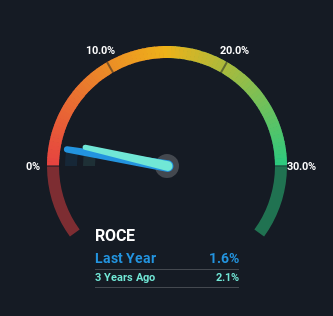- Japan
- /
- Wireless Telecom
- /
- TSE:9984
SoftBank Group (TSE:9984) Has Some Difficulty Using Its Capital Effectively

What financial metrics can indicate to us that a company is maturing or even in decline? When we see a declining return on capital employed (ROCE) in conjunction with a declining base of capital employed, that's often how a mature business shows signs of aging. This combination can tell you that not only is the company investing less, it's earning less on what it does invest. Having said that, after a brief look, SoftBank Group (TSE:9984) we aren't filled with optimism, but let's investigate further.
Return On Capital Employed (ROCE): What Is It?
If you haven't worked with ROCE before, it measures the 'return' (pre-tax profit) a company generates from capital employed in its business. Analysts use this formula to calculate it for SoftBank Group:
Return on Capital Employed = Earnings Before Interest and Tax (EBIT) ÷ (Total Assets - Current Liabilities)
0.016 = JP¥516b ÷ (JP¥45t - JP¥12t) (Based on the trailing twelve months to December 2023).
So, SoftBank Group has an ROCE of 1.6%. In absolute terms, that's a low return and it also under-performs the Wireless Telecom industry average of 12%.
Check out our latest analysis for SoftBank Group

In the above chart we have measured SoftBank Group's prior ROCE against its prior performance, but the future is arguably more important. If you'd like to see what analysts are forecasting going forward, you should check out our free analyst report for SoftBank Group .
So How Is SoftBank Group's ROCE Trending?
There is reason to be cautious about SoftBank Group, given the returns are trending downwards. To be more specific, the ROCE was 3.5% five years ago, but since then it has dropped noticeably. On top of that, it's worth noting that the amount of capital employed within the business has remained relatively steady. This combination can be indicative of a mature business that still has areas to deploy capital, but the returns received aren't as high due potentially to new competition or smaller margins. If these trends continue, we wouldn't expect SoftBank Group to turn into a multi-bagger.
The Bottom Line
All in all, the lower returns from the same amount of capital employed aren't exactly signs of a compounding machine. Yet despite these concerning fundamentals, the stock has performed strongly with a 43% return over the last five years, so investors appear very optimistic. In any case, the current underlying trends don't bode well for long term performance so unless they reverse, we'd start looking elsewhere.
SoftBank Group does come with some risks though, we found 2 warning signs in our investment analysis, and 1 of those shouldn't be ignored...
If you want to search for solid companies with great earnings, check out this free list of companies with good balance sheets and impressive returns on equity.
New: Manage All Your Stock Portfolios in One Place
We've created the ultimate portfolio companion for stock investors, and it's free.
• Connect an unlimited number of Portfolios and see your total in one currency
• Be alerted to new Warning Signs or Risks via email or mobile
• Track the Fair Value of your stocks
Have feedback on this article? Concerned about the content? Get in touch with us directly. Alternatively, email editorial-team (at) simplywallst.com.
This article by Simply Wall St is general in nature. We provide commentary based on historical data and analyst forecasts only using an unbiased methodology and our articles are not intended to be financial advice. It does not constitute a recommendation to buy or sell any stock, and does not take account of your objectives, or your financial situation. We aim to bring you long-term focused analysis driven by fundamental data. Note that our analysis may not factor in the latest price-sensitive company announcements or qualitative material. Simply Wall St has no position in any stocks mentioned.
About TSE:9984
SoftBank Group
Provides telecommunication services in Japan and internationally.
Slight and fair value.
Similar Companies
Market Insights
Community Narratives



